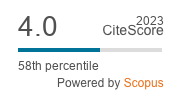Cost implications analysis of grid supplied electricity and solar source of electricity in Nigeria
Tobiloba Somefun, Claudius Awosope, Ademola Abdulkareem, Joseph Ojo, Elizabeth Amuta, Timilehin Sanni
Abstract
Energy is a key component in the overall growth of every nation. Insufficient energy delivery hinders political growth, restricts social growth, limits economic growth, and negatively affects the standard of living of citizens, bothin urban and rural areas. Sufficient energy delivery increases food production, improves the standards of living of citizens, improves healthcare and enhancements in other human services, enhances industrial output, provides effective and efficient transportation not forgetting adequate shelter to the citizens of the nation. Currently, there is a significant level of deficiency in Nigeria’s energy sector. This study seeks to address this issue by analysing cost implications of conventional energy source and solar energy source. This study brings to focus the payback period of a solar powered home and the return on investment that might accrue during this time to the residential home owners. Furthermore, the best cost-effective load sharing option for residential owners considering two energy sources is also obtained.
Keywords
cost implication; energy; power holding company of Nigeria; solar system;
DOI:
http://doi.org/10.12928/telkomnika.v18i6.13558
Refbacks
There are currently no refbacks.
This work is licensed under a
Creative Commons Attribution-ShareAlike 4.0 International License .
TELKOMNIKA Telecommunication, Computing, Electronics and Control Universitas Ahmad Dahlan , 4th Campus+62 274 564604
<div class="statcounter"><a title="Web Analytics" href="http://statcounter.com/" target="_blank"><img class="statcounter" src="//c.statcounter.com/10241713/0/0b6069be/0/" alt="Web Analytics"></a></div> View TELKOMNIKA Stats


